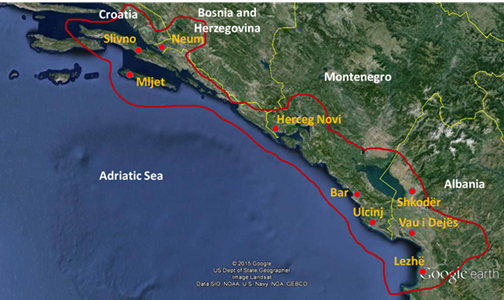
The region of SEE needs development of proper waste management models and policy recommendations through regional dialogue platform for improved coordination and progression of waste management issues. It will encourage the SEE countries to initiate joint natural resources management in order to promote sustainable environmental and socio-economic development of the rural and coastal cross-border areas. In this regards, the project “Solid Waste Management in cross-border rural and coastal areas of SEE region” aims to improve the conceptual and organisational framework conditions for Integrated Solid Waste Management (ISWM) in cross-border rural and coastal areas in SEE by achieving the following specific objectives:
- to asses and develop the most suitable model for integrated management of solid waste in the cross-border communities;
- to facilitate exchange of experiences and best practices among concerned stakeholders, as well as presentation of the EU context on effective solid waste management;
- to develop measures and policy recommendations which will foster the EU approximation process of future policy development and implementation;
- to set solid waste management at the agenda of the local authorities and local communities (raise awareness) and
- to strengthen the cooperation between local and central governments for establishing dialogue on future policy creation and fostering the overall development process of the cross-border and rural communities.
The project is implemented among three partners: “Network of Associations of Local Authorities in SEE” (NALAS), “Regional Rural Development Standing Working Group in SEE” (SWG), and the “Deutsche Gesellschaft für Internationale Zusammenarbeit GmbH” (GIZ).
Interventions of the project that will be implemented in the period July 2015 till June 2016 focuses on three designated pilot areas:
- Coordinated by NALAS and the respective Local Government Associations is the pilot area along the Adriatic Sea coastal region of Albania, Montenegro, Bosnia and Herzegovina and Croatia. This area is affected by floating solid waste, originally derived from the rural settlements along the sea shore of Albania.
- Coordinated by SWG is Sharra mountain area, covering the cross-border rural municipalities between Macedonia, Albania and Kosovo*, as well as,
- River bank areas of Drina-Sava cross-border region between Bosnia and Herzegovina, Croatia and Serbia and river bank area of Drina-Tara cross-border region between Bosnia and Herzegovina, Montenegro and Serbia.
The target groups of the project are: the local and national authorities, solid waste management institutions and organizations, Faculties and CSOs in the SEE countries. In this regard, 9 municipalities from four countries of the NALAS pilot area along the Adriatic Sea coastal region will be actively involved in the project implementation: Shkodra, Vau i Dejes and Lezha (ALB); Ulcinj, Herceg Novi and Bar (MNG); Neum (BiH) and Mljet, Slivno (CRO).
It is expected the involved municipalities to contribute in the development of the most appropriate model of ISWM through the assessment process and active participation at the national events-workshops organized by respective LGAs in each of the countries. In addition, the respective experience of the municipal authorities will be utilized in the identification of challenges and needs for establishment of cross-border integrated solid waste management models within the two sessions of the Regional Dialog Platform.
Based on the agreed models for integrated solid waste management in all three regions (mountain, river banks, and sea coast), measures and regional policy recommendations will be developed and disseminated at national and local level. The policy recommendations will be endorsed by the NALAS General Assembly and SWG Assembly.